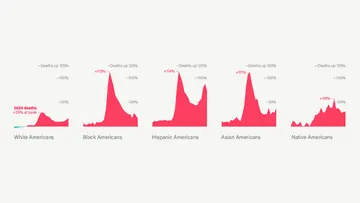This is The Marshall Project’s Closing Argument newsletter, a weekly deep dive into a key criminal justice issue. Want this delivered to your inbox? Subscribe to future newsletters here.
If you live in a large city, you probably don’t worry much about finding a lawyer, should you ever need one. Whether you can afford that lawyer is another matter, but they are available. As a city-dweller, I can easily recall the names of several local defense attorneys just from thinking of bus advertisements and billboards I pass on a typical drive.
In much of rural America, the situation looks vastly different.
The Denver Post reported this week that 23 of Colorado’s 64 counties now fall into the category of “legal deserts”: mostly rural places where there is fewer than one attorney per 1,000 people. It’s hardly just a Colorado problem, said Pamela Metzger, director of the Deason Criminal Justice Reform Center at Southern Methodist University. She told me that lawyers in rural areas skew much older than those in cities and are retiring at a much faster pace than they are being replaced, citing research on legal deserts in Texas.
“We don't teach about it in law school. We don't make it a viable career opportunity, and we’ve priced everybody out of practicing in rural areas,” Metzger said.
Legal deserts are just one of many barriers people face in obtaining legal representation, the most apparent one being cost: By some estimates, 80% of criminal defendants can’t afford a lawyer. Indeed, 2023 marks 60 years since the Supreme Court ruled in Gideon v. Wainwright that state courts must provide attorneys to criminal defendants who can’t afford their own.
The case spurred the creation of public defender officers as a counterpart to prosecutors in the criminal system. Notably, though, the idea of public defense is much older, the brainchild of Clara Shortridge Foltz, also the first woman to practice law in California. She first pitched the idea at the 1893 World’s Fair.
John P. Gross, a law professor at the University of Wisconsin, makes the case that the promise of Gideon is one that’s largely gone unrealized. “The mere presence of defense counsel lends our justice system the veneer of legitimacy, while the inability of defense counsel to do the job required of them makes it rotten at its core,” he writes, in an editorial for The Hill.
Gross zeroes in on the chronic underfunding and understaffing that has left public defender systems in many states — including Oregon, Louisiana and New Mexico — in a near-perpetual state of crisis, with defenders assigned to many more cases than they can realistically handle. Those problems extend beyond the lawyer scarcity in rural areas and into many of America’s largest cities as well.
Criminal court systems are also not consistent about who qualifies for a public defense, and some deny court-appointed lawyers even to very poor people. In other cases, people may receive public defender services, for which they are then billed and plunged into debt. This month, the state of New Jersey abolished these fees and canceled old debt as well.
A lesser-known limitation of Gideon is that many elements of the criminal court process do not come with the constitutional guarantee of a lawyer. Roughly half of U.S. counties do not provide defense counsel at bail hearings — which determine if a person will await trial behind bars — potentially for months or even years, according to an analysis from the Rand Corporation,
Similarly, despite a recent rule change in Mississippi, low-income criminal defendants there frequently go months without a lawyer between their preliminary hearing and being indicted, Caleb Bedillion wrote for The Marshall Project earlier this month.
Research suggests that a lack of representation at these early stages may leave more defendants, who are presumed innocent, locked up. Pittsburgh, Pennsylvania, began offering defense counsel at some bail hearings several years ago, but didn’t have enough lawyers available to provide one for all defendants. That created an accidental experiment on the effect of legal representation, and the difference was clear: People with lawyers were 20% more likely to be released without cash bail than those who didn’t have a lawyer.
Many of the circumstances that land people in court are not criminal prosecutions and therefore do not offer the protections of Gideon. Migrants held in immigration detention, for example, are not entitled to lawyers during removal proceedings. Lawmakers in New York and the U.S. Congress have recently drafted legislation to change that, but neither proposal has become law. Experts told AZ Central’s Rafael Carranza that “having an attorney to represent them in court is the single biggest factor in whether someone with a pending immigration case in the U.S. is successful with their claim.” For some cases, like asylum-seekers fleeing targeted violence, the difference can be life or death.
Earlier this year, the Biden Administration guaranteed all asylum-seekers access to counsel during newly expedited screening interviews. But that promise so far “appears largely unfulfilled,” The Associated Press reported.
Only about 3% of people facing eviction have lawyers, compared to 81% of landlords, according to the advocacy group National Coalition for a Civil Right to Counsel. Largely spurred by the COVID-19 pandemic, many cities, counties, and three states have started “right to counsel” programs to provide legal assistance to low-income people facing eviction. In some cases, the differences have been profound. In Kansas City, more than 91% of tenants who received legal services under the program avoided eviction, compared with a 99% eviction rate before it was rolled out, according to one of the nonprofits running the effort.
Alicia Johnson, who leads another of the organizations providing legal services, told KCUR in Kansas City that having a lawyer makes it more likely a tenant will show up to contest an eviction. In some cases, access to a lawyer “means the difference between them actually going to court and not going to court.”
